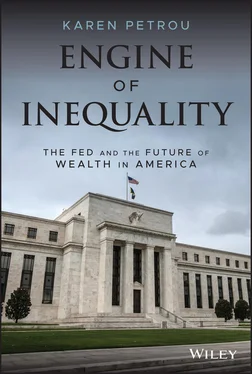1 Cover
2 Title Page Engine of Inequality The Fed and the Future of Wealth in America Karen Petrou
3 Copyright Copyright © 2021 by Karen Petrou. All rights reserved. Published by John Wiley & Sons, Inc., Hoboken, New Jersey. Published simultaneously in Canada. No part of this publication may be reproduced, stored in a retrieval system, or transmitted in any form or by any means, electronic, mechanical, photocopying, recording, scanning, or otherwise, except as permitted under Section 107 or 108 of the 1976 United States Copyright Act, without either the prior written permission of the Publisher, or authorization through payment of the appropriate per-copy fee to the Copyright Clearance Center, Inc., 222 Rosewood Drive, Danvers, MA 01923, (978) 750-8400, fax (978) 646-8600, or on the Web at www.copyright.com . Requests to the Publisher for permission should be addressed to the Permissions Department, John Wiley & Sons, Inc., 111 River Street, Hoboken, NJ 07030, (201) 748-6011, fax (201) 748-6008, or online at www.wiley.com/go/permissions . Limit of Liability/Disclaimer of Warranty: While the publisher and author have used their best efforts in preparing this book, they make no representations or warranties with respect to the accuracy or completeness of the contents of this book and specifically disclaim any implied warranties of merchantability or fitness for a particular purpose. No warranty may be created or extended by sales representatives or written sales materials. The advice and strategies contained herein may not be suitable for your situation. You should consult with a professional where appropriate. Neither the publisher nor author shall be liable for any loss of profit or any other commercial damages, including but not limited to special, incidental, consequential, or other damages. For general information on our other products and services or for technical support, please contact our Customer Care Department within the United States at (800) 762-2974, outside the United States at (317) 572-3993 or fax (317) 572-4002. Wiley also publishes its books in a variety of electronic formats. Some content that appears in print may not be available in electronic books. For more information about Wiley products, visit our web site at www.wiley.com . Library of Congress Cataloging-in-Publication Data is Available ISBN 9781119726746 (Hardcover) ISBN 9781119727538 (ePDF) ISBN 9781119730057 (ePub) Cover Design: Wiley Cover Image: ©P_Wei/Getty Images Author Photo: courtesy of the Author
4 Dedication To Basil, whose tireless patience, encouragement, and critical rereading made this book possible along with so much more .
5 Acknowledgments Acknowledgments Grateful thanks are extended to Matthew Shaw, whose research helped to ensure that this book is as right as we can make it, and to Arezou Rafikian for her never-ending cheerful willingness to clean up all my typos. Space does not permit thanks also to the many bankers, policy-makers, industry critics, and friends who have read portions of the manuscript and provided both encouragement to be sure this story is told and constructive comments to make sure it's told correctly. Appreciation also to Leah Spiro, my bulldog agent; Bill Falloon, a very helpful editor; Ellen Kadin, who framed key parts of the initial proposal; Barbara Hendricks; and Mark Fortier and his crack advisory team. Finally, a pat on the head for Zuni, my German Shepherd guide dog. Her unflagging and enthusiastic presence got me to and from many meetings, speeches, and drinks with friends that honed my thinking.
6 About the Author About the Author Dubbed by the American Banker “the sharpest mind analyzing banking policy today — maybe ever,” Karen Petrou is one of the most sought-after financial consultants in Washington and one of the most influential experts on financial policy and regulation in the world. She is Managing Partner of Federal Financial Analytics, the Washington, DC, financial services consulting firm she co-founded in 1985. It does not lobby for anyone, providing strategic and policy analysis and advisory services to major financial institutions and global central banks. Her views can be found almost every day in the Financial Times, American Banker, Wall Street Journal , NPR, CNBC, and many other media. In addition to testifying before the US Congress, she has spoken before the Federal Reserve Banks of New York, St. Louis, San Francisco, and Chicago; the European Central Bank; the International Monetary Fund; and many other governmental, industry, and academic groups. She also provides strategic guidance to foundations on a pro bono basis in connection with work by her and her husband, Basil, to create new funding instruments to speed biomedical research. Winners of the Visionary Award in 2019 from the Foundation Fighting Blindness for this work, the Petrous live in Washington, DC, with Zuni, a German Shepherd guide dog.
7 Introduction Notes
8 Chapter 1: Inequality: Why It's So Much Worse and What to Do About It What We Know about Inequality that Economists Don't The Economic-Recovery Mirage Why So Unequal So Fast? Regulatory Wreckage How to Fix Financial Policy Notes
9 Chapter 2: How Unequal Are We? Economic Inequality Fundamentals Who Has How Much What of Wealth? The Inequality Engine Worse Than That The Most Inclusive Ever? The Great Financial Crisis and Its Equality Aftermath Notes
10 Chapter 3: What Makes Us So Unequal The Mechanical Engineering of Economic Inequality Death and Taxes The Role of Transfer Payments A Supply-Side Solution? Public Wealth: A Sputtering Part in the Equality Engine Is Education the Answer? Is Trade Policy a Problem? Global Policy Reform? What to Do? Notes
11 Chapter 4: Why Does Economic Inequality Matter So Much? Inequality and Mortality Political Polarization Inequality's Eviscerating Cost Inequality and the Long Recession Financial-Crisis Risk Notes
12 Chapter 5: Following the Money How Central Banks Work The Modern Monetary-Policy Construct The Fed's Bailout Buckets The Fed's Payment Powers Rules of the Financial Road Four Fundamental Financial-Policy Flaws Notes
13 Chapter 6: How Monetary Policy Made Most of Us Poorer The Fed's Heavy Hand Why It's the Fed's Fault How Ultra-Low Interest Rates Made America Still Less Equal and QE Still More Inequitable The High Cost of Low-Rate Debt The Low-Unemployment Myth The Anti-Wealth Effect Making Matters Still Worse A Bigger Fed, Lower Rates, an Extreme Financial Crisis Notes
14 Chapter 7: How to Make Monetary Policy Make Us More Equal The Aggregate-Data Error The Fed's Real Mandate The Fourth Mandate The Fed's Giant Faucet Possible Solutions Slowing the Inequality Engine Notes
15 Chapter 8: Reckoning with Regulation Consumer Finance Before the Crash Are Debtors Just Deadbeats? Are Banks to Blame? The Businesses Banks Left Behind Other Precursors of the Crash That Came Capitalism and Capital Regulation A Capital Cure Going with the Flow Death without Destruction The Consumer-Protection Quagmire An Unreadable Rulebook Thrown Only at Banks The Bleak Outlook and a Better Future Notes
16 Chapter 9: Remaking Money What Money Is and Will Be The Great Unequalizer Turning Money into Data What Makes Money Good Money Crafting a Good Digital Dollar How Money Moves The Central-Bank Solution Notes
17 Chapter 10: Rules to Equitably Live By Why Not Just Deregulate? Learning to Love Like-Kind Rules The Specifics of Symmetric Regulation Raising Up the Regulatory Playing Field Building a New, Equality-Focused Banking System Banking While Mailing Establishing Equality Banks New Money for a New Mission Notes
18 Chapter 11: Financial Policy for an Equitable Future Turning the Fed into a Force for Good The Fed's Failings The Fed's Equality Toolkit The First Fix: Understanding America as It Is The Second Fix: Set an Equality Plan and Say So The Third Fix: A Far Smaller Fed Portfolio The Fourth Fix: Normal, Moderate Interest Rates The Final Fix: Ensuring Financial Stability Ending the Doom Loop The Future of Equitable Finance Notes
Читать дальше












